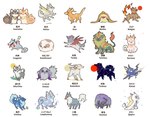Jan 7th: Small update to the Uploading Guidelines today: We now no longer allow paintovers of AI generated content. Or in other words AI generated content that has been edited to some degree by humans.
Dec 1st: If your account has been hit in the most recent ban wave of compromised accounts please reach out to us at management[at]e621.net and we'll help you get your account back.
If you've already contacted us give us a moment to get to you, though if it takes longer than a day for us to get back to you do feel free to reach out again!
Dec 2nd: If you got got and suddenly aren't able to see any of our exquisite selection of sausage and taco posts double check that Safe Mode is disabled in your account settings (Account -> Settings -> Safe mode [right above the blacklist text box]).
We still have a Discord server, come talk to us!
Want to advertise on e621? Click here!
Are you an artist uploading your own art to e621? Get verified now!

Bongani
Member"Kerberos" is used rather than "Cerberus" because Japanese transliteration of Greek goes off the actual Greek, rather than the Anglicised bastardisations.
Hence, Cerberus is pronounced with a hard K, and "titan" is pronounced TEE-tahn instead of TY-tan.
Anonomenclature
Member*Latinized bastardization.
Latin spelled most of the words it stole from Greek that had a hard K with a hard C, instead. At some point, the o morphed into a u (maybe to make it a neater Second Declension noun? I dunno.), but you'll find both spellings in Latin sources.
That means a bunch of formerly Roman territories all spell Cerberus, and a bunch of other Latinized Greek loan-words, with a soft C/hard C instead of a K, and with a -us instead of an -os. Cause that's how the ole Romans did it.
Like, it's Cerbère in French, Cerbero in Italian, Cerber in Polish, and Zerberus in German. That last one's a bit wild, but it still follows the Latin form.
So we can blame the Romans (as we can for so many things), and then about fifteen hundred years of phonetic drift.
Login to respond »